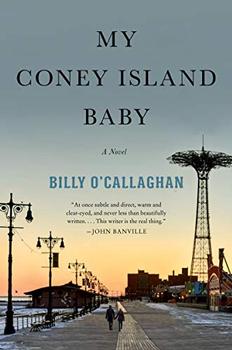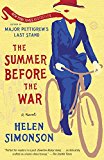Summary | Excerpt | Reading Guide | Reviews | Beyond the book | Read-Alikes | Genres & Themes | Author Bio

A Romance
by Graham SwiftNow that the wildly successful television series Downton Abbey has run its course, might I suggest an alternative for Anglophile readers (and for any television executives who might be reading this) experiencing withdrawal symptoms from their weekly dose of Britannia? Although containing less drama and fewer characters, Graham Swift's Mothering Sunday could form the basis for a superb Masterpiece Theatre production, as it deftly parses the lines of class and gender among the English tweed-and-tennis set in the wake of World War I. The whole thing is so steeped in the stiff-upper-lip ethos of Edwardian propriety that it practically demands to be read in the drawing room with a cup of Earl Grey tea served in Limoges bone china teacups.
As for the novel itself – which is subtitled simply "A Romance" – it's a rather wispy thing. Swift, a multiple award-winning author who's collected many of the biggest British literary prizes for his previous books, is working in a lighter vein here. The fantasy-like subtitle, and the opening lines "Once upon a time," telegraph the depth of thought to which the reader will be exposed. But though the tone for much of the book hovers just above that of fairy tale, there are ample satisfactions in the unfolding of this rags-to-riches tale – and some gorgeous writing as well.
Mothering Sunday takes its name from the now-mostly-disregarded European tradition (see 'Beyond the Book') of setting aside one day a year when children would return to their ancestral home church and to be with their mother. As the tradition evolved, in some places the focus turned to domestic servants, who were given the day off from the manor houses in which they worked to allow them to return to their mothers for the day. The protagonist of Swift's novel, a domestic named Jane Fairchild who has worked at a country estate called "Beechwood" for seven years, spends her Mothering Sundays not with her mother (she's a foundling and has no idea who her mother is), but with her secret lover, Paul Sheringham, the heir of a sizable nearby estate (and fiancé of a fashionable lady). Roughly the first third of the novel recounts just one such morning in 1924 that they spend together.
The reader is treated to a gauzy, dream-like rendering of their encounter, which involves a lengthy, post-coupling account of watching Sheringham dress for a late lunch date with his fiancé as Jane lounges languidly on the still damp bed sheets, aware that their own trysts will end with his marriage in two weeks:
Well, they were steeped in experience now. He had never known anyone better, she was sure of it. Nor had she. It was in the look he gave her now. And in the stare she returned.
She found it difficult, even as she started, not to let tears come into her eyes, even as she knew that to allow them, use them, would have been somehow to fail. She must be brave, generous, merciless in allowing him this last possible gift of herself.
Would he ever forget her, lying there like that?
To the book's credit – and to my great relief – the story avoids a predictable, romance novel-type plot, wherein the ill-used but virtuous Jane finds a way to extract her lover from his impending union, proving that social class is no match for the heart's true desire. No, none of that happens. Swift takes the book in a rather unexpected direction. Not only is there a somewhat shocking twist, but it's also in the way the story is told. The second half contains a narration of what Jane went on to do with her life for the next sixty years, and it's mostly told rather than shown. Swift provides page after page of phrases such as "And she, Jane Fairchild, would never know what became of Beechwood or Upleigh [Sheringham's estate]. She would never go back. It was almost a superstition."
It's a bit jarring to have spent so much time on just one scene in Jane's life (more than 60 pages on her encounter with Sheringham – a third of the book), and then to have the rest of her life – six decades – raced through so quickly. And it's not for lack of interesting plot points. Jane goes on to have a surprisingly interesting and fulfilling life, as Swift tells it. I don't know why he chose to record it so matter-of-factly rather than show it – there are some potentially richly dramatic scenes that he merely dispenses with in a few declarative sentences. For instance, the reader learns Jane ended up at Oxford: "Her Oxford Days! Her Oxford years! Oh, they were great days. She saw Oxford all right. It was an education. And to be perfectly honest, she was sometimes in some respects the educator." Hmmm. Why not mine the richness of such a potentially interesting scenario?
After a glittering beginning among the polo pony set and their coterie of domestics, Swift seems to have lost interest in the larger story. The last portions of Mothering Sunday read more like notes for a novel than an actual novel. Perhaps that's why he gave the work the subtitle: "A Romance" – to evade the expectations of a fully realized work.
There are, to be sure, some sublime moments in the early going, and some marvelous sentences throughout the book: "All the scenes that never occur, but wait in the wings of possibility."; "She would never quite erase, even when she was ninety, her inner curtsey"; and this genuinely beguiling observation: "Few things could be more shocking than for a woman to enter a library naked."
Tucked within the 175 pages of this story are enough ideas hinted at for several seasons of episodic television, perhaps even a century-spanning epic, rooted in the realm of Upstairs-Downstairs-style domestic intrigue. Swift effectively immerses the reader in the life of a relatively powerless chambermaid in the early going, but the rapid unfolding of events in the latter half prevents the arc of Jane's life from being genuinely affecting. Perhaps we'll have to hope for that television series one day for a more complete and satisfying realization of the story.
![]() This review was originally published in The BookBrowse Review in June 2016, and has been updated for the
January 2017 edition.
Click here to go to this issue.
This review was originally published in The BookBrowse Review in June 2016, and has been updated for the
January 2017 edition.
Click here to go to this issue.

If you liked Mothering Sunday, try these:

by Billy O'Callaghan
Published 2020
An exquisite, heart-breaking novel by an Irish discovery.

by Helen Simonson
Published 2017
The bestselling author of Major Pettigrew's Last Stand returns with a breathtaking novel of love and war that reaches far beyond the small English town in which it is set.
What really knocks me out is a book that, when you're all done reading, you wish the author that wrote it was a ...
Click Here to find out who said this, as well as discovering other famous literary quotes!
Your guide toexceptional books
BookBrowse seeks out and recommends the best in contemporary fiction and nonfiction—books that not only engage and entertain but also deepen our understanding of ourselves and the world around us.